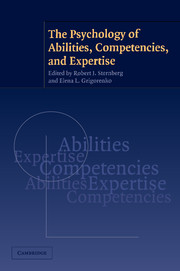Book contents
- Frontmatter
- Contents
- Preface
- List of Contributors
- The Psychology of Abilities, Competencies, and Expertise
- 1 Trait Complexes, Cognitive Investment, and Domain Knowledge
- 2 Intelligence as Adaptive Resource Development and Resource Allocation: A New Look Through the Lenses of SOC and Expertise
- 3 Developing Childhood Proclivities into Adult Competencies: The Overlooked Multiplier Effect
- 4 The Search for General Abilities and Basic Capacities: Theoretical Implications from the Modifiability and Complexity of Mechanisms Mediating Expert Performance
- 5 On Abilities and Domains
- 6 Expertise and Mental Disabilities: Bridging the Unbridgeable?
- 7 The Early Progress of Able Young Musicians
- 8 Expertise, Competence, and Creative Ability: The Perplexing Complexities
- 9 Biological Intelligence
- 10 What Causes Individual Differences in Cognitive Performance?
- Index
- References
5 - On Abilities and Domains
Published online by Cambridge University Press: 05 June 2012
- Frontmatter
- Contents
- Preface
- List of Contributors
- The Psychology of Abilities, Competencies, and Expertise
- 1 Trait Complexes, Cognitive Investment, and Domain Knowledge
- 2 Intelligence as Adaptive Resource Development and Resource Allocation: A New Look Through the Lenses of SOC and Expertise
- 3 Developing Childhood Proclivities into Adult Competencies: The Overlooked Multiplier Effect
- 4 The Search for General Abilities and Basic Capacities: Theoretical Implications from the Modifiability and Complexity of Mechanisms Mediating Expert Performance
- 5 On Abilities and Domains
- 6 Expertise and Mental Disabilities: Bridging the Unbridgeable?
- 7 The Early Progress of Able Young Musicians
- 8 Expertise, Competence, and Creative Ability: The Perplexing Complexities
- 9 Biological Intelligence
- 10 What Causes Individual Differences in Cognitive Performance?
- Index
- References
Summary
INTRODUCTION
Questions concerning the relationships among an individual's innate abilities, learned competencies, and potential for success (for example, as measured by assessed level of expertise) in a given domain are important to theorists of human cognition and behavior; such questions are also germane to educators, policy makers, employers, and others who wish to make informed decisions that will both maximize human potential and make the most effective use of limited resources. In our view, a fundamental challenge inheres in any attempt to understand how an individual's unique profile of capabilities relates to possible future outcomes (for example, in terms of ultimate success within a domain). One must be able to parse the space of human biopsychological capacities (abilities), as well as the space of culturally valued knowledge and skills (competencies) that comprise domains, in such a way that the proposed link is predictive of success without being unnecessarily over-prescriptive. Most individuals could succeed in any of a number of domains, and many factors other than sheer ability determine this space of possibilities; any theorist seeking to link abilities to potential for expertise in one or more domains should seek to do so within these parameters. In particular, these considerations rule out the possibility of correlating individual ability profiles with suitable careers or jobs in anything approximating a one-to-one manner.
- Type
- Chapter
- Information
- The Psychology of Abilities, Competencies, and Expertise , pp. 126 - 155Publisher: Cambridge University PressPrint publication year: 2003
References
- 40
- Cited by

